Impairment in vision and hearing are very common in today’s world especially in the senior citizens but this does not have to decrease the quality of life for them. When caring for a senior at home, there should be ways in which such sensory issues are considered, and the patient’s independence maintained. Even small adjustments can allow seniors to carry out their everyday activities with reduced risk of falls and injuries. Now let’s discuss how we could make the lives of seniors who have vision or hearing impairment a little easier.
The Environment
Home related factors are closely related to the ability to perform functions, especially when vision or hearing is reduced. Even a little modification can go a long way. For the difficulty in seeing at night it is recommended to ensure that lighting is provided at places like staircases, hallway or bathroom. Motion-sensor lights are ideal because a senior does not have to look for a switch wherever they are. Getting rid of common tripping hazards such loose carpets or clutter can also prevent the risk of falls.
When hearing loss is the problem, having a calm environment around them can be very helpful. Minimizing noises from other sources such as television or radio makes communication a lot easier. For seniors with hearing loss, there are many issues in the home; alarms, doorbells, among others, you could consider a visual aid alarm where they can see through flashing lights that an alarm or doorbell has gone off, or vibrating alerts that can notify them of something important. All of these small changes can easily make the home life much more tolerable for seniors and their caregivers.
The Use of Practical Tools
For seniors who suffer from some degree of sensory loss, the use of assistive devices can greatly enhance their quality of life. The visually impaired persons can find practical use in such aids as magnifiers, books in large print, and talking clocks to enable them to continue with activities they enjoy. They can also enjoy using smart home gadgets, like smart assistants or smart speakers that enable them to remind them about something, listen to music, or call someone.
Similarly, there are many technologies available for hearing loss. Although hearing aids are common, amplified telephones, wireless headsets for television, and personal sound amplifiers can help them in many ways. These tools support independence of the senior as well as reduce frustration and the need for frequent aid from others.
Regular Health Check-Ups
In order to effectively manage vision and hearing loss it is important that people undergo health checks ups, regularly. They should have regular eye and hearing check-ups done so that they can know of any changes and obtain new prescriptions for glasses or contact lenses or hearing aid, respectively. These make it possible to find out about any issues at an early stage so that they do not progress into something much worse.

The caregivers can help by arranging transport and appointments, especially if the senior suffers from mobility problems. Promoting such regular examinations makes seniors understand that the caregivers acknowledge their health and try as much as possible to let them be as independent as they want.
Communication
For senior citizens with hearing problems, maintaining open communication with family and caregivers can not be an easy task. Simple adjustments could be enough for improving these interactions to be much easier. When communicating, speaking slowly and clearly, and facing the senior will help as the senior may revert to lip-reading or facial expressions. Another thing is to minimize the background noise while speaking and also make sure the senior understands that a conversation is going on by gently alerting him or her first.
Another part of the vision reduced patient’s management is offering important documents as exact timing of taking medication or an appointment in large print. And for the digital stuff, using larger fonts on devices like smartphones or tablets, enables seniors to continue engaging in texting, e-mailing or video calling with their loved ones.
Emotional Well-Being
Vision or hearing impaired seniors are bound to feel socially isolated or have feelings of frustration from dealing with the problems. While making physical adjustments, it is good to accompany this with emotional support as well. It is crucial for caregivers and families to help seniors open up about their feelings and help them get the help when they need it. Participating in activities that can make them happy, like listening to music, going for walks or being with family members can have a positive effect on the mental health of seniors.
For seniors who like using gadgets, they can attend online meetings or join support groups to meet other seniors with relatable situations through the internet. The approach should be such that it can encourage a positive mindset, while also being patient with the frustrations that come from sensory loss, to maintain a fulfilling life.
If you are a senior, you know the difficulties that vision and hearing loss can present. Our goal is to give each person we serve the unique opportunity to stay in their home comfortably and safely. We’ll help organize health check ups, assist in daily activities, or provide emotional support. Visit 1st Care Community’s website to learn more about our services and how we can help you and your loved one.


